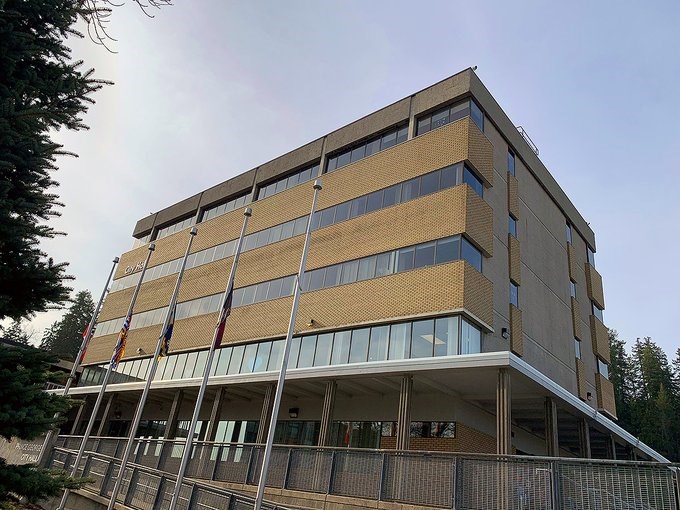The flags at Prince George city hall have been lowered to half-mast today (April 14) to mark the fifth anniversary of drug-related overdoses being declared a public health emergency in B.C.
Five years after former Provincial Public Health Officer Dr. Perry Kendall called a public health emergency, the BC Coroners Service reports illicit drugs have claimed the lives of nearly 7,100 British Columbians.
The number of overdose drug deaths across the province have gone from 991 in 2016 to 1,724 in 2020, which is a 74 per cent increase from 984 deaths in 2019.
Last year was not only the deadliest on record for the province, but also for Prince George, Northern Health and the northern interior region.
In 2020, Prince George broke a 10-year record for illicit drug overdose deaths with 58, which is the highest number since 2010.
The most recent statistics from the BC Coroners Service show the crisis is not abating, with 174 deaths reported in January and 155 in February.
In 2021, Prince George has already recorded nine illicit drug overdose deaths.
These numbers represent British Columbians — teenagers to seniors in their 70s — who perished from using toxic drugs, most of which mixed with high concentrations of fentanyl and its analogues.
"Today, we remember and grieve the thousands of people who have lost their lives in B.C. due to a toxic illicit drug supply," said Lisa Lapointe, chief coroner, BC Coroners Service in a news release.
"I extend my heartfelt condolences to all of those who have lost a beloved family member or friend as a result of the unscrupulous and profit-driven illicit drug market. The tragic loss of these thousands of individuals underlines the urgent need for a substantial shift in our provincial and national response to problematic substance use."
While virtually no area of the province has been spared from the opioid crisis, First Nations communities have been particularly impacted.
The First Nations Health Authority (FNHA) reports between January and May 2020, 89 First Nations individuals died in B.C. due to illicit drug toxicity - a 93 per cent increase compared to the same period in 2019. During that period, 16 per cent of all drug toxicity deaths in B.C. were Indigenous people, who account for just 3.3 per cent of the province's population.
"While the COVID-19 pandemic has shown us how, as a province and a nation, we can mobilize and achieve incredible things together, it has also revealed a sadder truth - some dangers evoke more community concern than others," Kendall said. "There is a stark and dreadful contrast in how we as a society have responded to the two public health emergencies. 2021 is the year to stop temporizing and take the necessary steps to put an end to this tragedy.
Province to seek decriminalization
The province announced today that to address stigma, B.C. will officially request a federal exemption from Health Canada to decriminalize personal possession of drugs in the province to remove the shame that often prevents people from reaching out for life-saving help.
"Stigma drives people to hide their drug use, avoid health care and use alone," said Sheila Malcolmson, Minister of Mental Health and Addictions in a news release.
"Through province-wide decriminalization, we can reduce the fear and shame that keep people silent about their drug use, and support people to reach out for help, life-saving supports and treatment."
Officials with the Ministry of Mental Health and Addictions and Health Canada have been working on an agreement that outlines how the Province of B.C. will work with Health Canada to apply for a provincewide exemption to the Controlled Drugs and Substances Act, which governs simple drug possession.
The province says key issues for consideration are defining simple possession, determining allowable drug amounts and ensuring the readiness of law enforcement, health and social services to support decriminalization.
Consultation with Indigenous partners, peers, law enforcement, municipalities and public health officials is being planned.
The Ministry of Mental Health and addiction says decriminalization is one additional tool in B.C.'s accelerated overdose response plan that also includes harm reduction, prevention, treatment and recovery, while building a system of mental health and substance use care.
The Province is also boosting funds to secure recently expanded overdose prevention services for people at high risk of overdose provincewide.
A new $45-million investment over the next three years will extend and enhance the funding announced in August 2020 to support those services to save more lives.
"The COVID-19 pandemic is having devastating effects on people who use drugs - illicit substances are more toxic and people are struggling with increased isolation," Malcolmson said in the release.
"Today, our government is committing to sustain and enhance services in every health authority to prevent overdose deaths and connect people to supports. There's more to come as we continue building the comprehensive system of mental health and addictions care that British Columbians deserve."
This investment will support people who use drugs by enabling health authorities to continue scaling up their regional overdose responses through new and expanded overdose prevention services, including inhalation sites to meet the growing need for this mode of consumption.
Health authorities are hiring new registered nurses who can prescribe addiction treatment medications, in addition to social workers and peer support workers for new and existing interdisciplinary outreach teams.
- with files from Mike Howell, Glacier Media, and Jess Fedigan, PrinceGeorgeMatters



